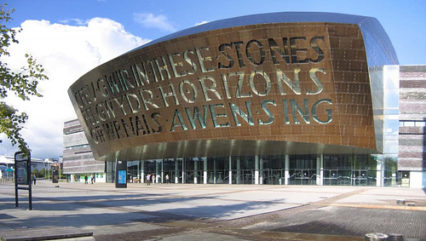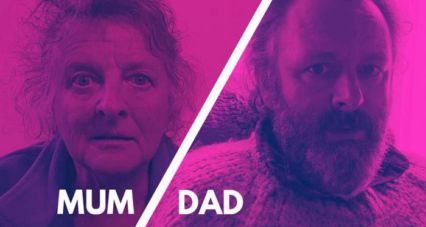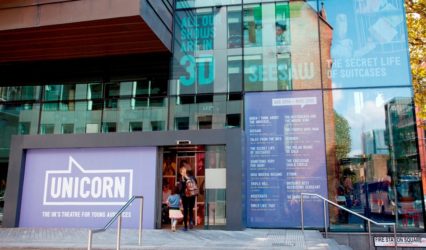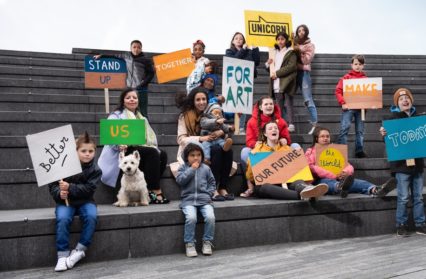Nick Davies looks at the state of play in Welsh theatre and ponders an uncertain future. Halfway through 2020 and it is already proving to be the most challenging year in the recent history of theatre in Wales. And yet there have been extraordinary stories of theatre’s refusal to be dimmed – whether through digital performances, old-fashioned letter writing, or even contributing to the safety of frontline NHS workers.
“It’s actually a really exciting time for theatre here in Wales. A real opportunity for change,” says Abdul Shayek, leader of Cardiff-based company Fio. It is not the answer many would expect when discussing how the theatre industry in Wales might come through a global pandemic. Shayek is discussing the industry’s struggle with the Covid-19 lockdown alongside its response to the Black Lives Matter movement – an overlap on a Venn diagram promising, in his view, possibilities for substantive change as much as systemic challenges. “Coronavirus has meant that everything has re-focused in theatre. So-called outreach and community engagement used to be things that happened on the side, away from the main show – like the B team at a theatre company – but now the most active people are the ones doing the outreach work, continuing the conversations with audiences, including looking at diversity on stages and in organisations.” It is a pleasingly upbeat attitude that has led to the formation of a Wales Culture and Race Task Force, aiming to highlight and draw attention to the lack of opportunities for Black, Asian and Ethnically Diverse people within the arts sector.
Shayek’s refusal to be bowed by the biggest crisis in a generation is typical of the theatre community’s philosophy during these unprecedented times.
In March, I sat in the foyer of the Sherman Theatre with its artistic director, Joe Murphy. He spoke excitedly about his upcoming play that was about to go into rehearsal. As we chatted over coffee, the room gradually filled with people, the atmosphere already abuzz for a sell-out performance of Theatr Genedlaethol Cymru’s much anticipated Tylwyth. Just three months on, it’s a scene that feels like a theatrical utopia, some dreamlike echo of long-forgotten memories: theatre entrances welcoming audiences inside, plays (performed live on stages!), crowds, coffee served indoors – but, perhaps most poignant of all, it was a time when we dared to look forward, to embrace the prospect of new work yet to be made, to discuss a tangible future.
Coronavirus has taken a grip of global life in a way few of us could have imagined. While all facets of everyday life have been severely affected by the pandemic, few industries will confront structural challenges quite as grave as those facing the arts and theatre sector, a business wholly reliant on people teeming together in close proximity, usually indoors.
 When Cameron Mackintosh says that his London-based companies are making redundancies in order to survive, when England’s National Theatre talks of laying off a third of its staff in spite of cash-rich donors and royalties from blockbuster productions, then one fears the worst for the subsidised sector here in Wales.
When Cameron Mackintosh says that his London-based companies are making redundancies in order to survive, when England’s National Theatre talks of laying off a third of its staff in spite of cash-rich donors and royalties from blockbuster productions, then one fears the worst for the subsidised sector here in Wales.
The theatre organisations on the Arts Council of Wales’ revenue-funded portfolio largely maintain a hand-to-mouth existence, only fractionally covered by public subsidy. They need audiences and commercially generated income as much as any business. Even in more ordinary times, the futures of these companies were possible only thanks to an admirably incongruous combination of their own sturdy leadership and seat-of-the-pants decision-making, directors and boards perpetually challenged to buck a recessive global economy and falling audience figures. Previously, a healthy cash reserve for any of these companies would represent six months’ cash flow. Over three months into this crisis, the clock is ticking. And for those not on ACW’s arts portfolio, the outlook is even bleaker.
ACW’s response – though initially criticised for lagging behind funding bodies elsewhere in the UK – has been commendable. £7.5 million has been budgeted for its Covid-19 resilience fund, representing well over twice as much per head as ACE’s offer to the arts in England. However, there will be little left for Lottery projects beyond the pandemic, meaning Wales’ already strapped touring circuit is likely to diminish further.
And no such funding can completely plug lost revenue. Last week, the country’s largest arts venue, the Wales Millennium Centre, announced the closure of its building until at least next January. “When we closed our doors,” says managing director Mat Milsom, “we lost 85% of our income overnight.” It’s a chilling picture which we can expect to see replicated as the crisis rumbles on.
I n spite of the challenges, theatre continues, albeit in more varied guises. Just weeks on from our coffee in his theatre’s foyer, Joe Murphy tells me of the Sherman’s initiatives during lockdown over video call: “We can’t pretend we can do what we normally do. For artists at the moment, there’s loneliness, there’s isolation, anxiety, the sense of being cut off from your creativity… and we thought those are things we can do something about – with our time being one of our main resources, as well as our capacity to connect with a number of people.” A season of work called Interval was created, with TEN being the first of these developments. “We wanted to select ten Welsh or Wales-based writers to create short monologues to be performed and self-filmed by actors. The response to this was extraordinary with over 80 submissions from writers we knew and writers we’d never heard of. It’s a great way of platforming new talent along with more familiar writers – and we’ll be rolling out two of these plays a week on digital platforms.” Alongside TEN, Gary Owen has donated his couplet of plays, the excellent Mum & Dad available online.
n spite of the challenges, theatre continues, albeit in more varied guises. Just weeks on from our coffee in his theatre’s foyer, Joe Murphy tells me of the Sherman’s initiatives during lockdown over video call: “We can’t pretend we can do what we normally do. For artists at the moment, there’s loneliness, there’s isolation, anxiety, the sense of being cut off from your creativity… and we thought those are things we can do something about – with our time being one of our main resources, as well as our capacity to connect with a number of people.” A season of work called Interval was created, with TEN being the first of these developments. “We wanted to select ten Welsh or Wales-based writers to create short monologues to be performed and self-filmed by actors. The response to this was extraordinary with over 80 submissions from writers we knew and writers we’d never heard of. It’s a great way of platforming new talent along with more familiar writers – and we’ll be rolling out two of these plays a week on digital platforms.” Alongside TEN, Gary Owen has donated his couplet of plays, the excellent Mum & Dad available online.
Theatr Genedlaethol Cymru and National Theatre Wales have also busily created projects, some in partnership, notably the Creu Ar-Lein / New Digital Commissions with BBC Cymru Wales, including the six-hour experimental epic Er Cofid-19 alongside a gloriously pithy six minutes of Richard Nichols in Enfys. Kyle Legall and Mike Pearson’s Cardiff 1919: Riots Redrawn for NTW promises an urgent, startlingly apposite piece of theatre that can be experienced through your laptop and physically in the old Docks area of the capital. Other theatre-makers, too, from the funded and non-funded sector, have created work that can be viewed in lockdown.
This wave of digital dramas has enabled companies, artists and makers to remain active and to engage with audiences. Few people would prefer the experience to the live, visceral exchange between performer and audience but Joe Murphy maintains that it remains hugely important: “We exist to help people flourish through artistic engagement… so when lockdown happened, we agreed we needed to keep doing just that, even though it has to be in a different way.”
It is not only digital platforms that will ensure connection between theatre and audience. Fio’s Pen2Paper Challenge consciously spurned technology, inviting the public to write a letter on any subject to which the company would respond. It generated links with people never reached before. “We’ve had loads of great responses from across the world – from Nepal, India, Somaliland, Mauritius, New York, Chile…” Abdul Shayek says. “It’s a simple idea and sometimes that works well. Our thinking was that every theatre was looking online, and we thought, how can we make theatre on screen with the budgets we have, when we’re up against Netflix and HBO, or the big theatre companies streaming? The strength of theatre is the live-ness, being there in that moment. We’ve remained relevant, without necessarily doing theatre, but with Pen2Paper we’ve continued conversations, engaging people and being active.”
The Torch Theatre in Milford Haven has lain dormant since March, but a maelstrom of bad luck has rendered it impossible to significantly create artistic work. “It would have been nice to have had more of an online presence during lockdown but sadly with so many of the staff furloughed, we didn’t really have the capabilities and back-up for this. The priority has been to keep our permanent staff in jobs,” artistic director Peter Doran tells me. “We kept on a skeleton team but everyone else has been furloughed, including me.” As well as running a building with no audience to fill it, the Torch found itself – literally – caught in a perfect storm, as Doran explains: “In February, we lost part of the metal cladding on our fly tower during Storm Dennis, and as we’re built on the edge of a cliff, the cost of the scaffolding alone is massive… The only alternative is to close your eyes to the problem but with an 8ft by 4ft metal sheet blowing over the cliff in Milford, we just can’t risk any more coming off – sadly it has to be the priority.” This did not represent the end of the producing house’s problems: “I know other theatres have been given some emergency funding by their local authority to see them through this crisis. We, on the other hand, were given notice just before lockdown that Pembrokeshire County Council would, in fact, cut our grant to a bare minimum.”
The Torch’s ill fortune, though, has not deterred the team – in fact, it actually inspired an extraordinary life saving effort. “One thing we were very proud of was our technical team putting their heads together and developing a way of making visors for NHS staff and community health workers,” Peter Doran explains. “We made about 2,000 of them during the period when PPE was not readily available to so many on the frontline.” At a time when the importance of key workers is rightly appreciated, there have also been cases where this awakening to the importance of frontline employees has been used, unnecessarily, as a stick with which to beat the “non-essential” arts sector. The Torch demonstrates here just how important creativity and imaginative problem-solving – by necessity, core facets of every arts professional’s skillset – makes theatre as relevant and important as it has ever been.
Theatr Clwyd’s Together scheme has continued to engage communities in north-east Wales and beyond with a suite of new work created online as well as sharing clips and memories from the venue’s archive. Most positively, though, the building has received the go-ahead to press on with an ambitious £35 million refurbishment with the support of Welsh Government, Flintshire County Council and the Arts Council. It is a prospect that offers a rare glimmer of hope, an invitation to imagine a brighter future amid the gloom. And a reminder to other local authorities, including Pembrokeshire, of how a genuine commitment to theatre venues will provide their community with a resource that transcends work on their stages.
But what of the freelance sector, whose livelihoods are every bit as precarious as the companies on whom they rely? Have companies been supportive of artists during this period?
Sarah Argent and Kevin Lewis are two of Britain’s foremost makers of theatre for young people. “Theatres and venues have dealt with their two legal responsibilities,” Argent explains, “to audience members who had paid money for tickets (for cancelled performances) and to staff to whom the organisation had a duty of care and legal responsibilities as an employer. [Only after that…] have they been able to focus on support for freelancers. As one artistic director said, ‘Never before have these responsibilities seemed so in conflict’.”
M eaningful contact between companies and artists has been crucial – for both creative discussion and, perhaps more importantly, moral support, says Kevin Lewis. “Unicorn Theatre in London has been very supportive. Their artistic director (…) personally phoned to let us know the situation when our show was cancelled. We’ve been invited to talk through ideas for future projects. Theatr Iolo have been very supportive particularly again when our show was indefinitely postponed. I would expect nothing less from Theatr Iolo and it seems like they are supporting the other freelancers in their orbit.” But Lewis recognises this does not necessarily reflect everyone’s experience: “I do understand though that a number of freelancers feel isolated and abandoned.”
eaningful contact between companies and artists has been crucial – for both creative discussion and, perhaps more importantly, moral support, says Kevin Lewis. “Unicorn Theatre in London has been very supportive. Their artistic director (…) personally phoned to let us know the situation when our show was cancelled. We’ve been invited to talk through ideas for future projects. Theatr Iolo have been very supportive particularly again when our show was indefinitely postponed. I would expect nothing less from Theatr Iolo and it seems like they are supporting the other freelancers in their orbit.” But Lewis recognises this does not necessarily reflect everyone’s experience: “I do understand though that a number of freelancers feel isolated and abandoned.”
Coupled with this sense of isolation, many artists have found themselves in financial limbo, despite government interventions such as the furlough and Self Employment Income Support Scheme. “The systemic financial precariousness of freelancers has really been spotlighted by the inequality between the furlough scheme and the SEISS,” Argent explains, “and the fact that many artists fell through the cracks of this due to having received more than 50% of their income from PAYE, as has the fact that we are often not involved in discussions about strategy and policy and have been particularly marginalised at this time.”
Angharad Lee juggles work as a freelance director with running her Leeway Productions company, and echoes Argent’s frustration. “As a freelancer my work is eclectic and diverse, and as well as taking freelance contracts, over the past few years I have been a lecturer at a university. When lecturing, you have to take PAYE work. I am just over the threshold of PAYE work so cannot access the SEISS scheme and the university are refusing to furlough me.” Lee waits on a decision following an application for ACW support. “I feel ACW have been excellent. I can’t begin to imagine the hours it would have taken them to repurpose all that they were doing in order to release the emergency funds. And so many people have reached out to me knowing I am receiving no financial support, and this has been so valuable for my own wellbeing so can only imagine others like me feel the same.”
What can a sector so reliant on the self-employed learn from this period in history? “That freelance artists, embedded within their communities, are given the platform and the respect they deserve,” Lee believes. “We should be encouraging venues to contract freelancers on a more permanent basis. Unfortunately, many freelancers won’t survive the current hit. Many won’t want to come back to an industry who failed to catch them, and I don’t blame them.”
Both Angharad Lee and Sarah Argent have been sponsored by Welsh companies to be part of the lobbying group for a new UK Freelance Theatre Task Force. Argent states that the Freelance Task Force will look for “fundamental change in structures and hierarchies and [consider] whose voices are heard within the arts.”
“It is too much of a one-way relationship at the moment,” says Lee. “And until artists are placed front and centre of every conversation moving forward, nothing will change. There is no sector without freelancers.”
Perhaps, then, as Abdul Shayek believes in respect of issues of race and diversity, now is an important time for radical action. “It’s a time when theatre – everyone in it – can step forward and, if they really want to, make change happen,” he believes.
Creatively, with stages dark, it is a time for reflection. “I’m in discussion with a number of artists and organisations in the UK and overseas about creating new pieces of work,” says Sarah Argent. “Without the pressure of production deadlines and without having to think about the particular contexts in which work will be seen or experienced, it does feel as if (at times) my colleagues and I have been able to free our imaginations and talk more creatively than ‘at normal times’.”
But what of the future and a return to ‘normal times’? All sections of the theatre community – artists, companies, funders and audience – can only surmise what is to come. “We know we can’t operate as a venue whilst social distancing measures are still in force,” Peter Doran explains about the Torch Theatre. “At two metres we could have about 20% of our seats available and at one metre, it’s still only about 30%, meaning it’s impossible to make it work financially; so unless there is a big change in the thinking around social distancing, we probably won’t be able to operate for a while.” But with typical bullish optimism that is required to even begin a career in the performing arts, let alone sustain it through a crisis, Doran refuses to be beaten. “I acknowledge that things are looking very doubtful but, until we know for sure, we’ll keep going. Whenever we re-open, we plan to come back with a bang!”
Nick Davies is an author and critic.
Recommended for you:
Nick Davies began and spent most of the past decade working for the Arts Council of Wales, shaping the approach to the funding of Welsh theatre. He ends the 2010s independently reviewing and writing on theatre. Here he looks back on an extraordinary ten years and explains why history might come to regard them as the most divisive, exciting period we’ve ever known in Welsh drama.
For more Wales Arts Review coverage of National Theatre Wales, including news, reviews, and interviews, click here.



 Enjoyed this article? Support our writers directly by buying them a coffee and clicking this link.
Enjoyed this article? Support our writers directly by buying them a coffee and clicking this link.








